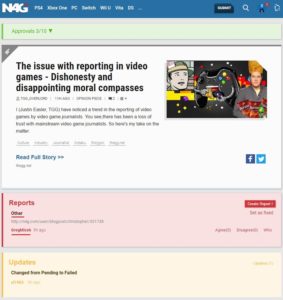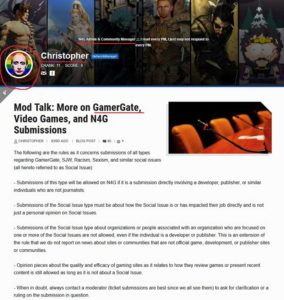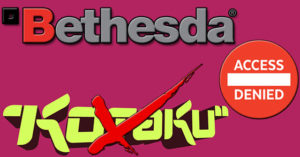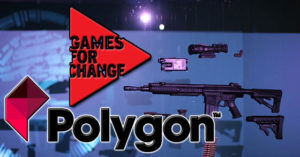The issue with reporting in video games – Dishonesty and disappointing moral compasses

***Update 1 – 2017-05-08 – 17:35 CEST***
I (Robin Ek, TGG) am rather upset at the moment. Why? Because I just found out that N4G.com pulled the plug on the post which you got in front of your eyes right now (I spent near two hours of work on this post…), and this is not the first time that this happens. In the matter of fact, not so long ago the N4G mods also killed off our “Bethesda PR accidentally invites Kotaku to a Prey event” and “Is Polygon trying to get Pewdiepie banned from Twitch?” post as well. However, in the case with those posts, N4G stated that they were not “Gaming related”, but this time I just got the “other” explanation shoved in my face. So what in the name of Grim Fandango does “other” mean then? Well, it’s a N4G rules page which Christopher (N4G Admin and community manager) created over two years ago (the page has been updated god knows how many times since it was published).

Ah, okay. So now it’s not even allowed to write about the problems that exist in the games industry either? (or how we could fix these problems) How…nice.
In other words, we were given the red card because this post was tossed into the #GamerGate basket (it’s absolutely forbidden to write about anything #GamerGate related on N4G). Funny enough though, we didn’t even mention GG in this post. You see, I/we did that on purpose to see if N4G would kill off the post anyhow. Well, they did indeed pull the plug on the post (even though people enjoyed this OP a whole lot). So I take it that N4G not only likes corruption and dishonesty, they also support it and silence whistle blowers (like us) when ever they get a chance to do so. Simply put, N4G.com is a part of the problem why the games industry is suffering from corruption, bad ethics and dishonesty.
Well, what can I say really? We’re working hard as hell to make the games industry better for everyone, and this is what we get back from N4G. Even so, I can’t say that I’m surprised though. Because there is like a huge list of subjects which you can’t publish on N4G.com, and that list seems to be growing for each day that goes by (it’s no secret to anyone that most of the N4G mods are biased to the max and have political agendas). Oh well…Now at least you know the reason why posts of this kind gets killed off on N4G.com. So please feel free to spread this post wherever you find it suiting to do so, because that gives unaware Gamers a chance to read the truth about what’s going on in the games industry.
Source:
N4G.com
I’ve only been writing for The Gaming Ground for a few months now, but even before then, I’ve noticed a trend in the reporting of video games by video game journalists. You see,there has been a loss of trust with mainstream video game journalists, and its due to their control of the news and the dishonesty they’ve displayed with their audience. Even so, this doesn’t affect me as much as it does the video game outlets like Kotaku and Polygon (whom both have a continued history of being dishonest with their audience). I mean, hell, I’ve written god knows how many articles on their disappointing moral compasses…Including one of my most-recent articles where a writer wrote not one, not two, but three articles on a game that he personally supported on Kickstarter. This wouldn’t have been a problem except for the fact that the writer didn’t add a disclaimer.
In other words, this broke not only the Code of Ethics in journalism, but also the website’s code. To make matters worse, when someone pointed out that they had a conflict of interest (the broken Code of Ethics, in particular) the comments were immediately deleted to prevent someone from finding out, but the Internet will never forget. This isn’t the only case at this point. In fact, it’s become a bit of a meme among the people so far deep into the video game industry. It makes the people who actually are good reporters watch their back, because the moment you mess up, your reputation is ruined among your audience, and your view count starts falling like my grandmother on roller blades. Here’s the problem:
It doesn’t have to be that way.
See, the people who write for the industry (particularly the reporters) are kind of like the bridge of the Industry between the people who supposedly represent the community (your game developers, publishers, what-have-you) and the audience, being the gamers. There are tons of bridges, so if one bridge in particular feels rickety, those crossing (be it the developers to the audience or vice versa) can take another. It’s all the same, if they’re able to keep regular contact with one another. The issue is that certain writers let it go to their head. Whether they believe they’re on top of the world (such as Ms. Leigh Alexander, a reporter who claimed to be the embodiment of games journalism), or that they desperately need money and will appeal to whoever they have to in-order to make that money. No matter what the case is, it’s dishonest.
What’s worse is that whenever a bunch of mainstream bridges start going down (like all the major video game news outlets) people start getting nervous about anyone in particular who claims to be media. So it’s not just that for the community, but also for developers themselves. The Industry Media has shown time and time again that they are more than willing to attack anyone who slips up, going to the point of absurdity if they believe it’ll drum up views from the tension and drama. In other words, if there is anything that sells more than sex, it’s drama.
Unfortunately, this is a problem that extends beyond video games. We see dishonest media everywhere we go, and many people are willing to put their faith in it, falling into their trap, and the only winners in this scenario are the reporters and the media. Luckily, when it comes to video games, it’s a slightly different story. Because there’s not only alternative, unbiased media (such as the site I work for), but also people in the Gamer community are more likely to turn away from biased, untruthful media outlets. Thus, these outlets suffer each time they do something dishonest.
However, while the Gamer community has cut themselves off from most dishonest media outlets, the media still has a grasp on the people who are higher up the ladder. In other words, the big-name media outlets still have control over the developers and other people who supposedly represent the community. As a result, because the reporters write dishonestly, the higher-ups start to believe that maybe, just maybe, that’s what the community wants. Whenever a reporter makes wild accusations about a game, the higher-ups see this as a sign that whatever it is they’re talking about is not what gamers want, and they change things without ever consulting us, and honestly I believe it’s because there’s no real way to communicate, given how much control the media has.
Speaking of which, I got to talk with Dan Hewitt (the vice president of Media Relations at the Entertainment Software Association, ESA for short) some time ago and speak with him about this communication gap, but he doesn’t believe there is one. He sees that the community, as wide and diverse as it is, has no problem coming together to discuss games on their own, even without the media. I believe that it’s true, that we can easily communicate and discuss our love for the medium that is games. However, that still doesn’t stop the influence which corrupt leaders of the media have over video games. Developers are still scared of them even though the shadow the media leaves over the industry is exaggerated in size comparable to how meager they really are, as most Gamers can contest to.
Luckily, as I’ve written about before, this year, for the first time ever, E3 (which is owned and operated by the ESA) is allowing everyone (including gamers) into the event. This is huge considering that prior to this, only the press and big names such as that of popular critics and YouTubers could even apply to attend. This could be a sign that the higher-ups want to connect with us without going through the media. This shows, as the media was legitimately upset with the decision to allow everyday people into the event. Why this is, no one knows for certain, outside of the fact that this means the Gamer community no longer has to rely on their dishonest media in order to get an idea of what’s to come in the oncoming year of games, essentially taking power away from the media.
As good as that might sound though, the sad truth is that until the heads of the media outlets start managing their writers a little better, this shoddy journalism will continue. There are people who will refuse to talk to me about issues like this because they’re afraid I will twist their words and make them look bad, no matter how honest I am. Nevertheless, that’s just a fact of life. I continue with my current job under the idea that maybe they’ll come to see me as a friend or ally against those that wish to slander them for view counts and money. However, until then, I must keep pushing forward and doing honest work until they recognize me as someone to be trusted.
Considering that video games are a huge part of our modern culture, being the second biggest industry worldwide, it’s important that these mainstream media outlets shape up if the Industry is to ever be taken seriously. Given the way they break the rules meant to keep a constant stream of honest communication, it’s clear that they don’t take their jobs very gravely. Which is a shame, as most of them make a good chunk of change to do what they do, far more than I could dream to make where I do (not to mention the benefits). At this point, I might sound petty or jealous, but I’m just pointing out that given all the luxuries of being a mainstream journalist. They should take their jobs seriously and write for their audience. If they keep writing to cause problems, they are tearing apart the industry they are supposed to be the bridge for.
This is the problem with video game journalism. There are too many dishonest people lying to and cheating the people who are supposed to be able to trust them. This needs to end. Either the media outlets need to set stronger guidelines to ensure honest journalism, including harsh penalties should they break the SPJ Code of Ethics, or they need to hire more truthful people. When I was hired, I was forced to go through a trial run to ensure that not only I was a decent writer worth my salt, but also to ensure that I was honest in everything I wrote. It wasn’t until my boss had complete faith in me that I was allowed to be given Triple-A status and allowed to get full benefits, as few as there actually are given our low-budget.
Nevertheless, I feel that if they started enforcing stricter rules that allowed for guaranteed honest journalism, including disclaiming when there’s an unavoidable conflict of interest, we could be taken more seriously as an industry because we won’t be focused on the petty stuff that could be fixed with a little honesty. However, that’s going to take a while. As I’ve said, the Industry is a large one, making tens of billions every year, and as long as the dishonest journalists have their hands up the backs of the Industry, they will still be around. Even so, that’s okay, because so will I, and so will many journalists who do care about the Industry and what we do. And while we don’t make as much money or have as much influence individually, I feel we’re far better off in the end.
And with that said, what’s your take on this matter? Let us know your thoughts in the comment section down below!
Credit:
Robin Ek – Editor and co-writer.
***Disclaimer***
This is a personal opinion of the writer, and it doesn’t necessarily represent the other writers (nor The Gaming Ground´s) opinions.
![]()
Justin Easler
Senior editor
The Gaming Ground
Twitter: @masterjayshay
More by Justin Easler:
- “Monster Energy Supercross – The Official Videogame 5” is coming to PC and consoles on March 17th, 2022
- Ubisoft’s E3 2019 press conference – A pretty decent presentation for the most part
- Square Enix E3 2019 press conference – Probably Square Enix’s strongest E3 in a long time
- Bethesda’s E3 2019 press conference – Some pretty awesome games but not so many surprises
- EA’s E3 2019 press conference – More of what you expect, yet still underwhelming
Tags: Ethics, Gamer, Gamers, Games journalism, Gaming, Kotaku, Polygon, Video games





























